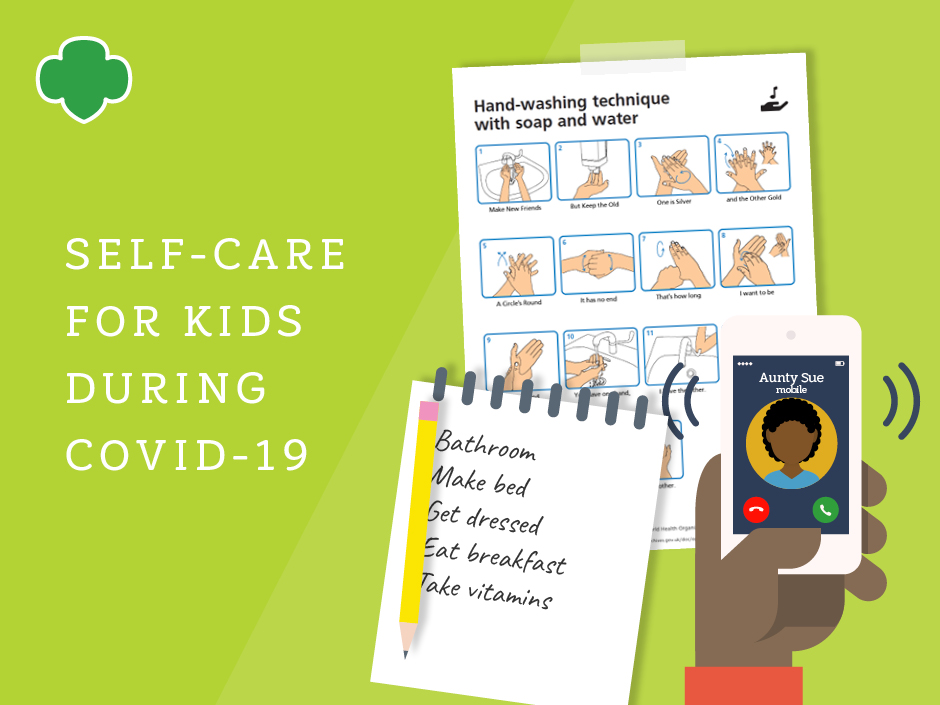 There’s no beating around the bush—we are in uncharted waters as we cope with the unfolding circumstances about COVID-19. But as a nation, we have experienced stressful times before, and during crisis, it can be difficult to remember that we have always pulled through. Now more than ever, we as adults need to serve as a steadying, guiding light for girls as we navigate this situation together. During this time, you may be wondering how you should address your kids’ concerns about the pandemic and what to do to make sure they’re practicing good self-care. Read on for tips.
There’s no beating around the bush—we are in uncharted waters as we cope with the unfolding circumstances about COVID-19. But as a nation, we have experienced stressful times before, and during crisis, it can be difficult to remember that we have always pulled through. Now more than ever, we as adults need to serve as a steadying, guiding light for girls as we navigate this situation together. During this time, you may be wondering how you should address your kids’ concerns about the pandemic and what to do to make sure they’re practicing good self-care. Read on for tips.
Keep Open Lines of Communication
There’s no comfort in being kept in the dark. While kids don’t need to know all the nitty-gritty details about COVID-19, they should have developmentally appropriate information about what’s happening in the world. Girl Scouts of the USA has an informative post on how to talk to your girls about the coronavirus. Remember to always lead conversations from a place of calm and not panic.
Keep in mind that kids process the news differently—some may be working through it internally while others ask lots of questions right away (and sometimes keep asking the same question over and over again even though you just answered it—not speaking from experience). Do your best to meet kids where they are. For internal processers, let them know you’ll check in with them again after they’ve had some time to digest what they’re hearing. For external processors who may need to talk out their feelings, be present to answer their questions and sort through underlying emotions.
Focus on What They Can Do
We know that the coronavirus is mainly transmitted from person-to-person via coughs, sneezes, and coming in contact with infected surfaces. Kids can take care of themselves and prevent the spread of germs by practicing excellent hygiene. That means covering their cough and frequently washing their hands (you know the drill, folks—20 seconds with soap and water). Side note: twenty seconds is a lot longer than most kids (And adults!) realize, so customize a poster together with fun lyrics to sing as they’re lathering up. Tape up the posters next to sinks and in bathrooms as a reminder.
Stay Connected
Though it’s imperative that we maintain social distancing to slow the spread of COVID-19, that doesn’t mean we have to be emotionally distant. Limiting our physical contact with the world can take a big toll on our kids and leave them feeling lonely and isolated. Thankfully, technology is a boon for keeping up a social life. Encourage your kids to text and maybe even use the phone to…call their family, friends, and loved ones. (I know, the novelty!)
And when they do connect, make sure that the coronavirus isn’t the only topic on the agenda. It’s important to still talk about “frivolous” things like what television shows they’re catching up on, the books they’ve been reading, or how their dad is using this newfound free time to learn how to floss (also not speaking from experience).
Maintain Routines
Like it or not, we’re all creatures of habit. Especially for kids, routines can be a great source of comfort when everything else feels like turmoil. Try to keep a consistent schedule (i.e., mealtimes, chores, and bedtimes) so your kids have some semblance of normalcy.
Reach Out for Mental Health Support
It’s not unwarranted to feel anxious, scared, and sad during this time of incredible change and uncertainty. Remember that there are many resources you can access to help cope with stress and high emotions. Refer to the National Alliance on Mental Illness Minnesota’s list of mental health support available. These resources aren’t just for your kids—reach out to a professional if you’re feeling overwhelmed yourself.
Often when we’re busy caring for others, the self-care we should also be practicing falls to the wayside. We’re so concerned about how everyone else is doing that we fail to check in with ourselves. Remember to block off time in the day to take a breather and focus on your own needs. We want to show up for others, but it’s okay (and paramount) to show up for yourself too. Take gentle care, friends.
 Lily Yu –Lily is a Program Resource Specialist at River Valleys. She earned her BA in comparative literature and Japanese from Hamilton College and has a background in publishing and advertising. Though she wasn’t a Girl Scout growing up, Lily is making up for lost time as a volunteer and troop cookie manager for her daughter’s Brownie troop. In her free time, she enjoys going for long walks, reading, and spending time with her family (And rescue dog, Neil!).
Lily Yu –Lily is a Program Resource Specialist at River Valleys. She earned her BA in comparative literature and Japanese from Hamilton College and has a background in publishing and advertising. Though she wasn’t a Girl Scout growing up, Lily is making up for lost time as a volunteer and troop cookie manager for her daughter’s Brownie troop. In her free time, she enjoys going for long walks, reading, and spending time with her family (And rescue dog, Neil!).